Is It Safe to Delete Duplicate Files? How to Safely Delete Duplicate Files in Windows 10
 9.0K
9.0K
 5
5
Duplicate files take up space, potentially causing your computer to slow down. And many of us have been there. Removing duplicates can free up space, which helps improve computer performance, and can help you better manage files. Is it safe to delete duplicate files? Certain types of duplicate files are definitely safe to delete. But it requires some knowledge to know which duplicates to delete.
This article will provide you with the information on what duplicate files are OK to delete and how to delete duplicate files on Windows 10 PC safely and easily.
 Cisdem Duplicate Finder
Cisdem Duplicate Finder
The Safest Duplicate File Finder and Remover
- Find duplicate photos, videos, audios, docs and all other duplicate files
- Find duplicate files on computer, phone, external hard drive, SD card, etc.
- Let you scan 1 or multiple folders/drives for duplicate files at a time
- Let you exclude folders/files (e.g. system folders) from the scan
- Display the found duplicate files for you to view and preview
- Automatically select all duplicates for you to delete with a click
- Let you select/deselect manually
- Also offer 9 rules (e.g. Select Newest) to help you mass select/deselect
- Safe and easy to use
- Compatible with Windows, Mac, Android and iOS
 Free Download Windows 10 or later
Free Download Windows 10 or later  Free Download macOS 10.11 or later
Free Download macOS 10.11 or later
Part 1. Is it safe to delete duplicate files on your computer?
Here’s the short answer: Certain duplicate files are safe to delete. They can be deleted to help free up storage and better organize files.
But we need to dig a bit deeper to know exactly what duplicates to delete and how to get rid of them without any risk. For this purpose, check out the Q&As below.
What are duplicate files?
Strictly speaking, duplicate files are files that exactly identical (regardless of how they are named). If two files have the same format, size and name but different content, they are not a set of duplicates.
What duplicate files are safe to delete?
Why do I have duplicate files on my computer? Is it safe to delete duplicate files?
For a variety of reasons, your operating system itself may duplicate files in order to work properly. Duplicates could also be generated when you install or use apps on your computer. I call them system or app related duplicate files. You should never delete them.
You create Word documents and other types of files on your computer. You import or download photos, videos, movies and songs, etc. to your computer. And you (unintentionally) create duplicate files by copying and pasting your files, or by importing/downloading files that already exist, etc. I call them user-created duplicate files. They are safe to remove in most cases.
Should I delete duplicate files?
Useless duplicate files on computer do nothing but take up storage space, reduce system performance, and make your computer run slower. It’s recommended to search and remove duplicate files on computer regularly. Before removing duplicates, make sure they are truly duplicate files, and your computer/applications don’t need them to run properly (or as they normally do).
Part 2. How to delete duplicate files in Windows 10 safely with duplicate file finder
Note: I think it can be a good idea to back up your files first.
Firstly, you can avoid important folders.
Secondly, stay away from those files with common system files extensions.
Lastly, you can move duplicates to the Recycle Bin.
Method 1. How to remove duplicate files in Windows 10 with Cisdem Duplicate Finder automatically
Cisdem Duplicate Finder identifies duplicates by comparing files’ hash values and files’ sizes. A hash value is a numeric value that is unique to a file. If two files have the same hash value, they are a set of duplicates. To ensure even more accuracy, the software also compares files’ sizes. It enables you to get rid of all redundant duplicate files at once.
Below are the steps.
1. Download and install Cisdem Duplicate Finder. Open it.
 Free Download Windows 10 or later
Free Download Windows 10 or later
2. To delete duplicate files in a folder on Windows 10, drag the folder into the software.
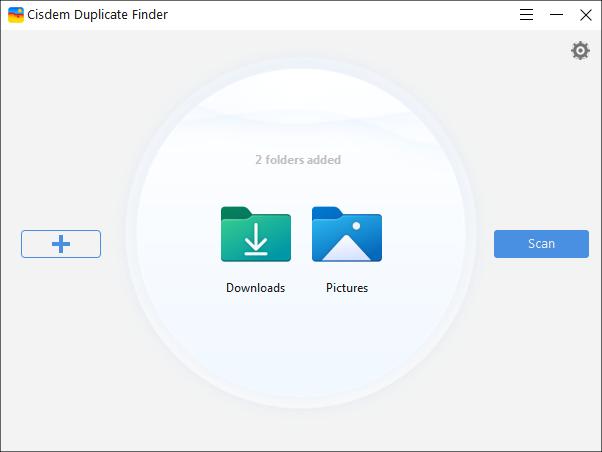
3. Click Scan.
4. When the scan is complete, the results window will display all the duplicate files that have been found. You can view them.
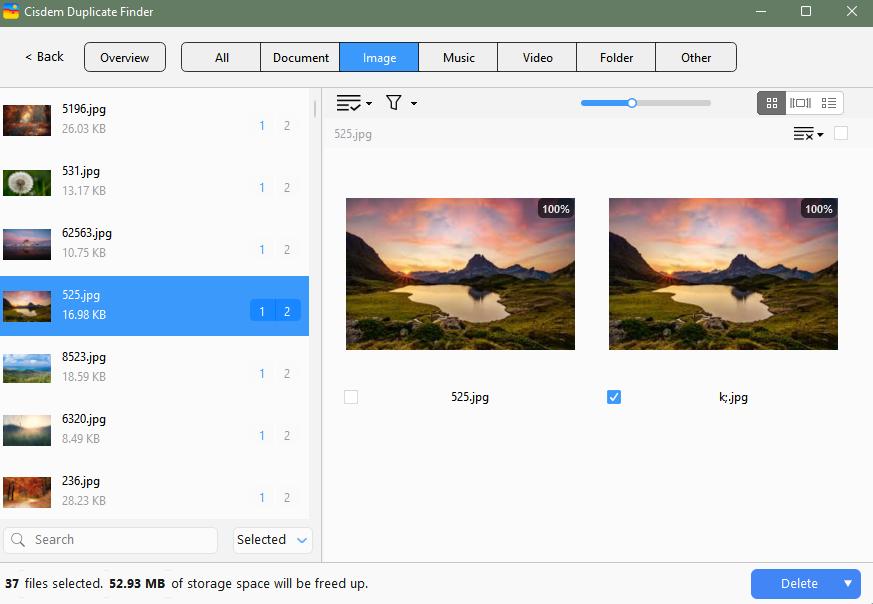
5. The software has automatically selected all duplicates for removal. Or, if you want, you can choose a selection rule or select by hand.

6. Click Delete to delete the selected unwanted duplicate files. Confirm the deletion.
Now the duplicate files will go to the Recycle Bin.
Tip 1: It’s not recommended to scan your entire PC for duplicates. But if you really want to do this, you can exclude the folders and files that you want to keep untouched, such as system files. To exclude them, click the settings icon ![]() in the top right corner and add folders and files to the Ignore List.
in the top right corner and add folders and files to the Ignore List.

Tip 2: If you want to handle the duplicate files in and across multiple folders, you can drag them all into the software in step 2. This tool helps you select duplicate files for removal by priority. For example, there are some duplicate files in your “photos folder” and “screenshots” folder. And you want to keep the duplicates in “photos” and delete those in “screenshots”. In such a case, you can go to Settings > Duplicate files. Choose the option “Select duplicates for remover from prioritized location”. Add folders and customize their priority.
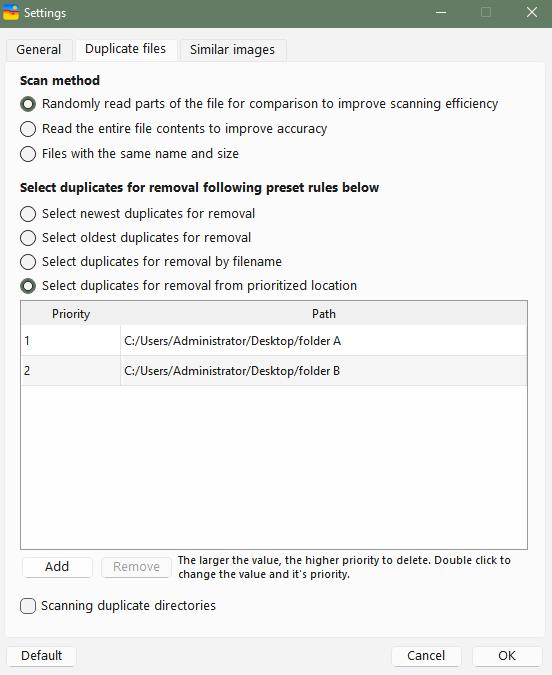
As you can see, this method allows you to delete all or multiple files on computer at once. It’s easy, reliable and efficient. Below is the video tutorial of this method.
Benefits:
-
It helps find duplicate files by file content, regardless of filenames.
-
Let you exclude system folders/files or files of particular extensions from scanning.
-
After scanning, it’ll automatically select duplicates for you to remover.
-
It also provides multiple selection rules to help you quickly and safely select duplicates to delete.
-
Convenient preview feature helps compare duplicate files side by side or view detailed information.
-
You can compare 2 folders to find and delete duplicate files using this tool.
-
For safety, all duplicate files that need to be deleted can be temporarily moved to the Recycle Bin.
-
Simple and intuitive user interface.
Shortcomings:
- Need to install third-party software.
Method 2. How to delete duplicate files on PC using CCleaner
If you have CCleaner installed on your computer, you may find that it allows you to search for duplicate files. Let’s find out how.
1. Go to Tools > Duplicate Finder.
2. In the Match by section, select the Size checkbox and the Content checkbox.
3. In the Ignore section, select the System files checkbox, the Read only files checkbox and the Hidden files checkbox.
4. In the Include section, select the folder(s) from which you want to remove duplicates.
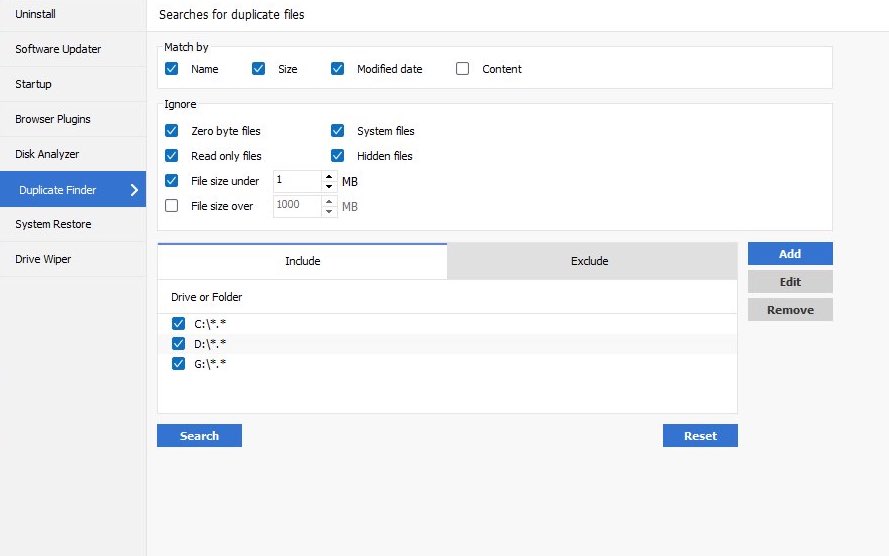
5. Click Edit. Click the Options dropdown menu and choose Include files and subfolders. Click OK.
6. Click Search.
7. When the search is done, in each set of duplicate files, select the unwanted duplicates for elimination.
8. Click Delete Selected.
Tip: Is it safe to remove duplicate files found by CCleaner? It can be safe. But in the first place, you need to set CCleaner to search in a proper way. For example, set the search to ignore system files and hidden files. This tool doesn’t provide smart selection rules to help you remove duplicates by priority, creation date, etc. The only way is to select files you want to delete one by one. There isn’t a built-in preview feature, so the viewing may be not convenient. When selecting duplicates for removal, make sure that you view the files and check files’ details.
Benefits:
-
It helps find duplicate files with identical content on your computer.
-
Let you ignore system files, read only files, etc. from the scanning list.
-
You can manually select duplicate for remover by comparing their path, creation date, and filenames.
Shortcomings:
-
It won’t automatically select duplicate files for deletion after scanning, which is not user friendly for users who have a lot of duplicates on computers.
-
It doesn’t have a built-in preview pane.
-
The tool keeps running in the background and it is difficult to uninstall it.
Part 3. How to delete duplicate files in Windows 10 safely with built-in tool
Windows system provides some built-in tools to help remove duplicate files. If you don’t want to use third-party tools, the 2 methods below can also find and delete duplicate files in Windows 10 safely.
Method 3. Get rid of duplicate files in Windows 10 for free with File Explorer
If you want, you can get the task done totally manually, without using software. The trick is to use File Explorer, which is built-in to Windows. With this method, it’s recommended to handle one type of duplicate files in one folder at a time, for example, the duplicate pictures in the Downloads folder.
1. Type indexing options on the Windows search bar. Open it.
2. Click Modify on the Indexing Options window.
3. Select Show all locations on the Indexed Locations window.
4. Check all the boxes on the Change selected locations section. Click OK.
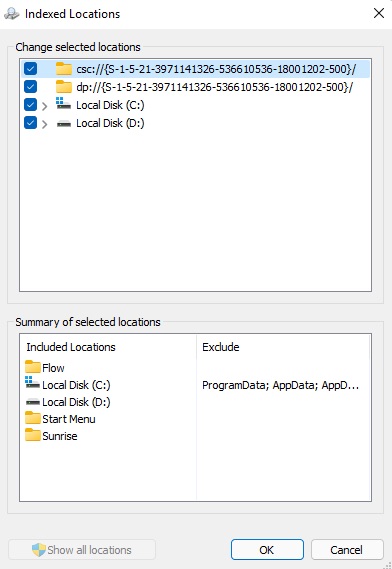
5. Press Windows + E on the keyboard. Start File Explorer and go to the folder in which you would like to delete duplicates.
6. Go to the View section. Select Details.
7. Go to the Sort section. Select More > Size/Name. Choose Ascending.
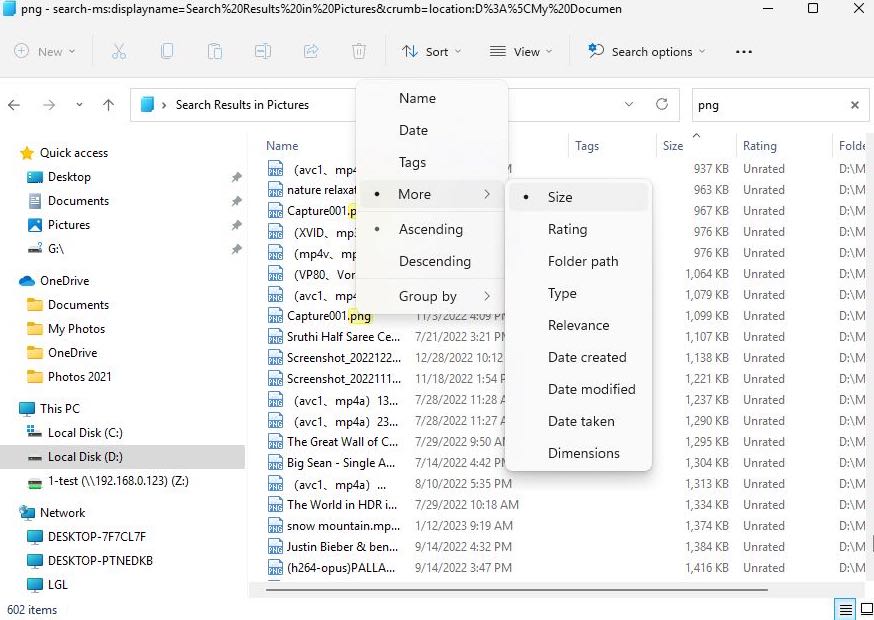
8. Use the search box on the upper right to display files of a certain type, such as PNG.
9. Click Search Options on the upper right corner. This allows you to find files in a specified size range, date modified time, etc.
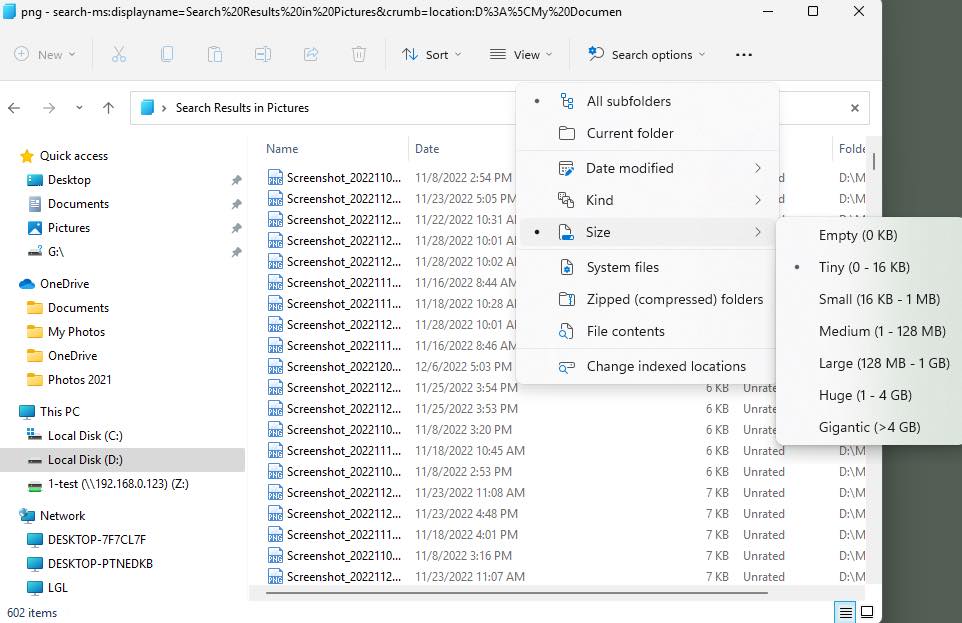
10. Manually compare all files to spot duplicates. Pay attention to those files with the same filename and file size.
11. Right-click one or multiple duplicates and choose Delete.
The deleted duplicate files will go to the Recycle Bin and they will stay there if that you don't permanently delete them. And you can note that this method can not find all duplicate files (because it only shows files with the same filename and size). And if you want to look for duplicate files better, I still recommend that you choose professional duplicate file finder tools. Because they can find duplicate files based on file content, this provides more accurate results.
Benefits:
-
This method can help you manually find duplicate files with the same filename/file size on Windows 10.
-
Let you deal with duplicate files of a certain file type on your computer.
-
You can view files’ name, date, size, location, etc.
Shortcomings:
-
It cannot find all duplicate files (like duplicates with identical content) on your computer.
-
Does not provide a way to exclude specific files/folders from being scanned.
-
The process is slow. You can only manually compare and select duplicate files one by one for deletion.
Conclusion
Is it safe to delete duplicate files? The fact is that duplicate files aren’t always unnecessary. Deleting system related duplicate files could cause your computer to malfunction. Always stay away from them. But most of the space-wasting duplicate files on your computer are safe to delete. I hope this article can help you understand the matter better and get rid of duplicate files without risk.
The methods on how to delete duplicate files in Windows are easy to follow and safe to use. You can search for and remove duplicate files regularly to have a better PC experience.

With a passion for tech and writing, Sarah joined Cisdem, where she focuses on creating articles about using utility tools to enhance file management and simplify contact management.

Adrian Li is Cisdem’s Chief Engineer and serves as the editorial advisor for Duplicate Finder and ContactsMate. His work and insights have been featured in leading tech publications such as Fossbytes, TUAW, Redmond Pie, SafetyDetectives, and BestForAndroid.






Ella Clark
I’ve been struggling with duplicate files for a while. This article introduced me a safe and quick method. Good!
Heindrik Rinsche
Follow the instruction step by step and it works! Took me less than 5 minutes to remove all duplicate files! Thank you!
Charlie Pils
Thanks for this wonderful article. It saved me from opening numerous folders on my PC just to check if they are duplicate files.
Claudia Fister
The last method seems a bit tedious, but it can accurately find all the duplicate files on my computer. Thanks to your great instructions!
Bernd Nauen
Too many duplicate files occupied unnecessary space on my computer,making it run slower. Thanks for your post, duplicates are now removed!